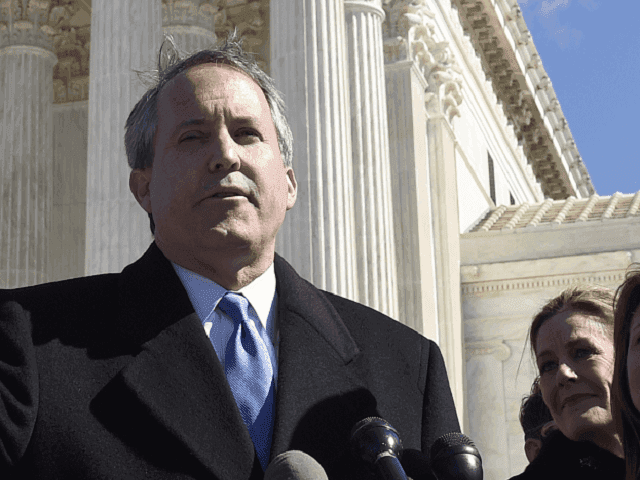The Texas Attorney General filed an amicus brief in support of a 10-state coalition fighting a court ban on President Donald Trump’s executive order on sanctuary cities.
Shortly after taking the oath of office, President Trump signed an executive order on border security and enforcement of immigration law. The order included a prohibition on federal grant money for state and local law enforcement agencies that refuse to cooperate with immigration officials. In April, a federal court in California blocked the order, Breitbart News reported.
“The Counties’ claims implicate a constitutional interest, the rights of states and local governments to determine their own local policies and enforcement priorities pursuant to the Tenth Amendment,” Judge William Orrick H. Orrick III of the U.S. District Court for the Northern District of California stated. “The Counties explain that their sanctuary policies reflect local determinations about the best way to promote public health and safety.”
“President Trump’s Executive Order is fully constitutional and a large step toward public safety,” Texas Attorney General Paxton said in a statement provided to Breitbart Texas. “If law enforcement authorities have policies of not cooperating with federal immigration authorities, dangerous criminals will unlawfully remain in the country, travel freely between states and continue to evade the justice system. Governments have a duty to protect their citizens – it is imperative that we honor federal laws and cooperate with ICE detainers to keep our communities safe.”
“Sanctuary jurisdictions obstruct cooperation between federal and local officials on immigration enforcement and undermine the rule of law,” the Texas AG continued. “When law enforcement is deliberately impeded, our communities become more dangerous by the day.”
The amicus brief (attached below) states the following:
In this case, Plaintiffs have mounted a pre-enforcement, facial challenge to an Executive Order concerning immigration enforcement—an area where Congress and the President have considerable power. The Order directs the Attorney General and Secretary of the Department of Homeland Security (“Secretary”), “in their discretion and to the extent consistent with law” (emphasis added), to “ensure that jurisdictions that willfully refuse to comply with 8 U.S.C. § 1373 (sanctuary jurisdictions) are not eligible to receive Federal grants. . . .” Exec. Order No. 13,768, 82 Fed. Reg. at 8,801. The statute cited in the Order, 8 U.S.C. § 1373 (the “Act”), prevents States from prohibiting local law enforcement from cooperating with federal officials. Plaintiffs bear the heavy burden of showing that the Order has caused them present injury and is unconstitutional in all its applications.
Plaintiffs cannot meet this burden. As an initial matter, the United States has not yet applied this Order to deny Plaintiffs any specific grant award, and the United States could not terminate or suspend an award without providing Plaintiffs with notice, an opportunity to object, and the right to appeal, as required by federal regulations. See, e.g., 2 C.F.R. § 200.341. Therefore, Plaintiffs cannot show that they will be harmed by some future, speculative application of the Order.
Nor can Plaintiffs show that the Order, which applies “only to the extent consistent with law,” would be unconstitutional in all its applications. To the contrary, as both Plaintiffs and the United States acknowledge, the federal government may validly place conditions on the States’ Case 3:17-cv-00485-WHO Document 114-1 Filed 06/16/17 Page 7 of 17 3 receipt of federal grant money as long as it complies with the conditions set forth by the United States Supreme Court in South Dakota v. Dole, 483 U.S. 203 (1987). See, e.g., United States Mem. Supp. Mot. to Dismiss 16–20, ECF No. 111; 2d Am. Compl. ¶¶ 122–32, ECF No. 105. 2 That is, Congress must (1) legislate to promote the general welfare, (2) ensure that the States have clear notice of the relevant grant conditions, (3) ensure that the conditions relate to the purposes for which the grant issues, and (4) ensure that the inducement to accept the grant is non-coercive. While amici States take no position on whether any existing grant program satisfies these criteria, the Dole factors provide a well-established path for the federal government to attach conditions to grants to the States that would be “consistent with law.” Plaintiffs therefore cannot show that the Order would be unconstitutional in all its applications, and if the federal government were to exceed its power in denying States particular sources of funding, Plaintiffs would have an opportunity to mount an as-applied challenge at that time.
Paxton also argues against the plaintiff’s claim that the executive order violates the Tenth Amendment to the U.S. Constitution, writing:
This challenge is also premature, as the United States has taken no action against Plaintiffs, and if it did, Plaintiffs would have the opportunity to bring an as-applied challenge. In any event, neither the Order nor the Act present Tenth Amendment problems.
The Tenth Amendment prohibits the federal government from conscripting States into administering federal programs. But to the extent that the States voluntarily accept federal grant money in exchange for compliance with federal immigration law, no such conscription has occurred. In addition, the Act itself does not require state law enforcement officers to do anything. Rather, it merely displaces state laws that directly conflict by prohibiting voluntary communications between such officers and federal officials, while leaving ample room for the States to take other actions to support and promote federal immigration policies.
Texas backs the federal government’s request that the case be dismissed.
Bob Price serves as associate editor and senior political news contributor for Breitbart Texas. He is a founding member of the Breitbart Texas team. Follow him on Twitter @BobPriceBBTX and Facebook.
Texas Attorney General Amicus Brief 2017.06.16 Sanctuary Brief

COMMENTS
Please let us know if you're having issues with commenting.